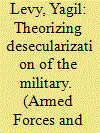| Srl | Item |
| 1 |
ID:
178606


|
|
|
|
|
| Summary/Abstract |
Numerous studies have analyzed Turkey’s Presidency of Religious Affairs (Diyanet) under the Justice and Development Party (AKP) government. This article focuses on the Diyanet’s new role in the politics of the family and argues that this role constitutes the main channel for its institutional expansion. By discussing the female preachers employed to reach more women and the Family Guidance Bureaus established to strengthen the family through religious guidance, the article looks at the ways in which both have expanded Diyanet’s institutional capacity to reshape gender and family relations along state-sanctioned religious lines. It also suggests that desecularization may offer a conceptual framework with which the implications of Diyanet’s expansion through familialist policies can be analyzed.
|
|
|
|
|
|
|
|
|
|
|
|
|
|
|
|
| 2 |
ID:
092065


|
|
|
|
|
| Publication |
2009.
|
| Summary/Abstract |
This article develops new insights into the gendered insecurities of the neoliberal state in Latin America by exploring the militarization of public security in Rio de Janeiro during 2003-08 around campaigns to stop the 'trafficking' of sex workers. Findings illuminate the intersection of three neoliberal governance logics: (1) a moralistic humanitarian-rescue agenda promoted by evangelical populists and police groups; (2) a juridical 'law and rights' logic promoted by justice-sector actors and human-rights NGOs; (3) a worker-empowerment logic articulated by the governing Workers' Party (PT) in alliance with social-justice movements, police reformers, and prostitutes' rights groups. Gender and race analyses map the antagonisms between these three logics of neoliberal governance, and how their incommensurabilities generate crisis in the arena of security policy. By exploring Brazil's fraught efforts to attain the status of 'human security superpower' through these interventions, the article challenges the view that the reordering of security politics in the global south is inevitably linked to desecularization, disempowerment, and militarization.
|
|
|
|
|
|
|
|
|
|
|
|
|
|
|
|
| 3 |
ID:
173754


|
|
|
|
|
| Summary/Abstract |
This article addresses scholarly deficiencies in identifying the conditions under which the desecularization of militaries takes place. To theorize this process, two militaries are studied, the United States and Israel. Arguably, six drivers sequentially generate the desecularization of the militaries: (1) Militaries largely mirror the growing influence of religion in the broader society. However, intramilitary drivers play their role in promoting/mitigating the extra-military mechanisms of desecularization. Thus, (2) organizational interests along with external constraints drive militaries to promote religious diversity, which may (3) lead to the empowerment of religious actors, and thereby to further desecularization through religious intolerance, and to (4) reliance on the spiritual and religious services provided by military chaplains, and jointly stimulate (5) the use of religion to motivate military sacrifice. By religiously increasing the symbolic value of military sacrifice, (6) religiosity becomes more naturally associated with good soldiering, thereby reshaping intramilitary hierarchies and, hence, further triggering desecularization.
|
|
|
|
|
|
|
|
|
|
|
|
|
|
|
|